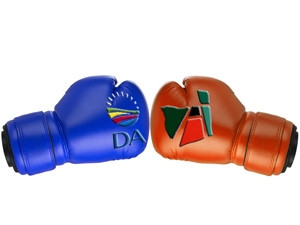
The road ahead for government's planned e-toll project is getting rockier by the week, as the SA National Roads Agency (Sanral) contends with the postponement of a crucial Bill, massive public opposition, credit evasion indictments and now accusations that the state-owned agency has been blatantly lying to the public about available resources.
A war of words has erupted between the Democratic Alliance (DA) and Sanral, after the political party yesterday claimed the roads agency is "misleading the public" about a lack of funds. Sanral promptly retorted this morning, saying the DA's claims are "shockingly misleading" and that the party's "politicking on [the issue of e-tolls] has become absurd".
In a statement yesterday, Ian Ollis, DA shadow minister of transport, said two independent studies - one by the Automobile Association of SA (AA) in 2008, and the other by the Southern African Bitumen Association (Sabita) concluded in 2009 - confirm the tax South Africans pay for fuel provides enough funding for the construction and maintenance of the country's roads. "[The studies prove] there is no need for the wholesale construction of toll roads."
Sanral has historically argued that the fuel levy is not enough to fund road infrastructure and maintenance - hence the need for e-tolling.
Ollis says he will request the chairperson of the portfolio committee on transport (Ruth Bhengu) summon Sanral CEO Nazir Alli and transport minister Ben Martins to account for what he says is their "failure to adequately explore the use of the fuel levy to fund road maintenance and that these two reports be tabled before the committee for its detailed consideration".
Sanral spokesperson Vusi Mona says the DA's latest move is "absurd". Mona points out that neither the Department of Transport, nor Sanral, is responsible for collecting or administering the fuel levy. "Revenue collection and the apportionment thereof is something within the purview of National Treasury. A political party like the DA should know that."
He says claims that the fuel levy is enough for SA's road infrastructure needs are false, a counter-claim he says is evidenced in the Development Bank of Southern Africa's (DBSA's) Infrastructure Report of 2012.
Rivalling reports
Ollis says the AA study reveals abolishing the dedicated fuel levy in 1988 resulted in significantly less spending on road infrastructure and maintenance, leading to the deterioration of the quality of our roads. "It shows that an ideal maintenance budget for roads should have totalled R32 billion in 2008."
The Sabita study, he says, indicates government only spent an average of R7.4 billion per year on road construction and maintenance between 2003 and 2008. "The 2013 Budget Review indicates income from the fuel levy for the same period averaged more than R21 billion. Questions must be asked why the nearly R14 billion was not spent on road maintenance in the first place."
Ollis says the same question must be asked of this year's ongoings. "The fuel levy is estimated to bring in R41.7 billion in the 2013/14 financial year. From the graph, compiled from information within the reports and the budget review, it is evident that the bulk of fuel levy funds between 2003 and 2008 have been used elsewhere and not for the use of maintenance projects."
Mona presents the DBSA's report in defence, saying it shows categorically that the fuel levy is not enough. "According to treasury, government collected R40 billion in fuel levies in 2012/13. The Gauteng Freeway Improvement Project alone required R20 billion. The N1-N2 Winelands Project requires an estimated R10 billion or even more.
"Add to that the N2 Wild Coast Highway Project and you have pretty much depleted the fuel levy. And that is just on three projects in a four provinces. We welcome the fuel levy but it is simply insufficient as the only source of funding.
"Anyone who has run a simple household budget can see that the DA's claims are preposterous."
Tit for tat
While the DA maintains collection of funds from the fuel levy - not e-tolls - is the answer, Sanral says the user pay principle is the only sensible way to go.
Ollis says: "A dedicated road maintenance fund - sourced primarily from the fuel levy - would ensure regular supply of funds to address the road maintenance backlog and eliminate the need of excessive tolls to fund road maintenance."
Mona says the reality is that the fiscus is and has always been constrained, requiring Sanral - and other state-owned entities - to look for alternative sources of finance. "Hence the use of public-private partnerships and the user pays principle in line with government policy."
He concludes that Sanral would be "taken aback" if the DA opposes the involvement of the private sector and the user pays principle in funding the country's infrastructure needs. "In the absence of these alternatives, we are left with only two sources of funding: taxes and debt. Which one of these suits the DA best?"
The DA maintains that government cannot expect South Africans to pay "yet again" for what the party says is "inefficient and ineffective use of available funding".
Share